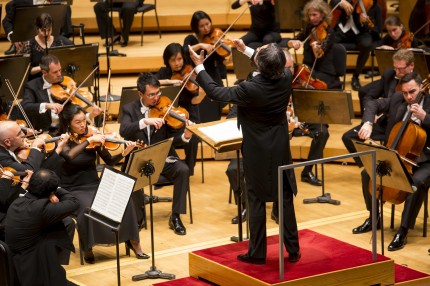Muti, CSO prep for tour with Debussy, Tchaikovsky

With the pomp and hoopla of opening week behind them, Riccardo Muti and the Chicago Symphony Orchestra got down to business Thursday night with the first sort-of regular week of season concerts.
The second half of this week’s program reprises Tchaikovsky Symphony No. 4, which was performed last Friday at Millennium Park. That work will be offered on the CSO’s European tour next month, as will Debussy’s La Mer, the evening’s centerpiece.
Apart from Symphonie fantastique and a handful of other works, French music has been infrequent to date in Muti’s Chicago tenure. To lead off the all-Gallic first half Muti opted for one of the least often played of Berlioz concert overtures, the Waverley, heard in its belated CSO debut.
Inspired, like so much 19th-century music, by the novels of Sir Walter Scott, Berlioz’s Opus 1 mixes some not-too-serious English pomp with a typically breezy Allegro in this tuneful, snappily scored work. Muti led a stately introduction, briefly marred by a section horn fluff. While the music could have smiled more, the refined performance had a spirit and vivacity that were hard to resist, with especially characterful playing from the woodwinds.
The ensuing performance of La Mer proved as strong and polished as one would expect from these forces. The final storm section was especially vividly characterized: the hushed, ominous tam-tam and bass drum rumbles evocatively painting the distant storm, the increasing gale winds reflected in the scurrying string figures and ultimately, the forceful brass and wind outbursts of the violent tempest at sea.
Yet overall Thursday’s Debussy performance felt like a decided work in progress. There was little atmosphere in the opening pages and, overall the performance felt too boldly outlined and emphatic, missing an essential sense of languor, mystery and half-tones. Charm and playfulness were likewise missing in a strangely severe “Jeux de vagues” (Play of the waves) and balances sounded off, with a jarringly overprominent celesta.
The performance of Tchaikovsky’s Symphony No. 4 largely echoed the reading delivered at the Pritzker Pavilion a week earlier. Thursday night the music was more firmly controlled, not always to the performance’s benefit. While tensile and dramatic, the opening movement at Millennium Park had a wild explosive quality not quite equalled Thursday night.
The depth of expression in the more subtly scored passages again registered, as with the unease in the string phrases and the relaxed-creepy woodwind descants in the Andantino.
The Scherzo undeniably gained from being indoors, the quiet precision and unanimity of the string pizzicatos and dynamic dips a striking example of hushed virtuosity. The finale was again rounded off in distinctive style. Muti’s take on the concluding movement is one more of desperation than exultation, an interpretation that fits the preceding movements more convincingly than overt tub-thumping. The buildup up to the coda went with a relentless, almost unhinged ferocity.
The program will be repeated 8 p.m. Friday and Saturday and 7:30 p.m. Tuesday. The Waverley Overture will be replaced by Mendelssohn’s Calm Sea and Prosperous Voyage Overture Saturday and Tchaikovsky’s The Tempest on Tuesday. cso.org; 312-294-3000.
Posted in Uncategorized
